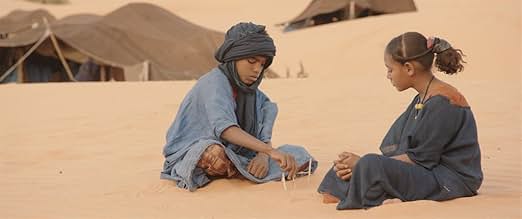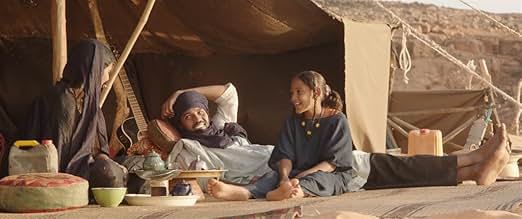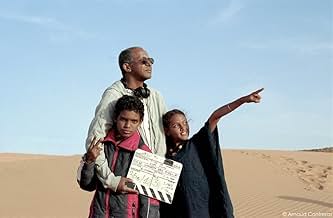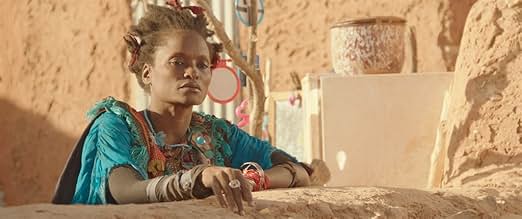Timbuktu
- 2014
- Tous publics
- 1h 36m
IMDb RATING
7.1/10
19K
YOUR RATING
A cattle herder and his family who reside in the dunes of Timbuktu find their quiet lives -- which are typically free of the Jihadists determined to control their faith -- abruptly disturbed... Read allA cattle herder and his family who reside in the dunes of Timbuktu find their quiet lives -- which are typically free of the Jihadists determined to control their faith -- abruptly disturbed.A cattle herder and his family who reside in the dunes of Timbuktu find their quiet lives -- which are typically free of the Jihadists determined to control their faith -- abruptly disturbed.
- Director
- Writers
- Stars
- Nominated for 1 Oscar
- 33 wins & 28 nominations total
Ibrahim Ahmed
- Kidane
- (as Ibrahim Ahmed dit Pino)
Yoro Diakité
- Djihadiste
- (as Yoro Diakite)
Weli Kleïb
- Juge
- (as Weli Cleib)
- Director
- Writers
- All cast & crew
- Production, box office & more at IMDbPro
Featured reviews
"Timbuktu" (2014 release from Mauritania; 99 min.) brings the story (fictional, by influenced by real events) of how the Mali town copes with the 'liberation' by jihadis. As the movie opens, we see the jihadis having a shooting practice by destroying the local wood statutes. The jihadis issue all kinds of rules ("smoking is forbidden! music is forbidden!"), much to the irritation of the local Mali population. We get to know one local family in particular, a husband and wife with their 12 yr. old daughter. They live a bit outside of the city center where the desert takes over, going about their daily business as best as possible. Then one day, one of the husband's cow accidentally destroys the fishing nets of the fisherman, who promptly kills the cow. The husband decides that he cannot tolerate this. To tell you more would spoil your viewing experience, you'll just have to see for yourself how it all plays out.
Couple of comments: first, it is a small miracle that a movie like "Timbuktu" could even have been made. Writer-director Abderrahmane Sissako shot the movie in Mauritania, which subs for Mali, but let's not kid ourselves. Mauritania is an "Islamic Republic", so it was no easy feat to shoot there either. Second, Sissako demonstrates again and again how much the local population resends the jihadis for uprooting their lives. There are several scenes in which a local man pleads with the jihadis ("where is forgiveness? where is leniency?"), to no avail of course. Playing soccer will cost you 20 leashes. Playing music comes at 40 lashes. Being in the room with someone from the opposite sex is another 40 lashes, and on and on. The fact that the neither side can understand the other (they speak Tamasheq in Timbuktu, the jihadis mostly speak Arabian, some also speak French or English) only makes the entire situation even more absurd. Second, while there are some shocking scenes in the movie, overall this is not a violent or graphic film. Almost on the contrary, in that the movie's editing and photography is done in such a way that it induces a false sense of peace and security. The photography in particular is pure eye-candy. Third, I have no idea where Sissako found these performers, but there are some wonderful performances, in particular from the wife and the 12 yr. old daughter. Bottom line: there is a good reason why this film is nominated for the Best Foreign Language Oscar, as it is a deeply moving film that will stay with you long after you have seen it.
The movie finally opened this weekend at my local art-house theater here in Cincinnati, and I went to see it right away. The matinée screening where I saw this at today was attended okay but not great, although I'm hoping that the bitter cold weather is a factor for that. If you like a top-notch foreign film that provides a glimpse of what real life under jihad is like, you cannot go wrong with this. "Timbuktu" is HIGHLY RECOMMENDED!
Couple of comments: first, it is a small miracle that a movie like "Timbuktu" could even have been made. Writer-director Abderrahmane Sissako shot the movie in Mauritania, which subs for Mali, but let's not kid ourselves. Mauritania is an "Islamic Republic", so it was no easy feat to shoot there either. Second, Sissako demonstrates again and again how much the local population resends the jihadis for uprooting their lives. There are several scenes in which a local man pleads with the jihadis ("where is forgiveness? where is leniency?"), to no avail of course. Playing soccer will cost you 20 leashes. Playing music comes at 40 lashes. Being in the room with someone from the opposite sex is another 40 lashes, and on and on. The fact that the neither side can understand the other (they speak Tamasheq in Timbuktu, the jihadis mostly speak Arabian, some also speak French or English) only makes the entire situation even more absurd. Second, while there are some shocking scenes in the movie, overall this is not a violent or graphic film. Almost on the contrary, in that the movie's editing and photography is done in such a way that it induces a false sense of peace and security. The photography in particular is pure eye-candy. Third, I have no idea where Sissako found these performers, but there are some wonderful performances, in particular from the wife and the 12 yr. old daughter. Bottom line: there is a good reason why this film is nominated for the Best Foreign Language Oscar, as it is a deeply moving film that will stay with you long after you have seen it.
The movie finally opened this weekend at my local art-house theater here in Cincinnati, and I went to see it right away. The matinée screening where I saw this at today was attended okay but not great, although I'm hoping that the bitter cold weather is a factor for that. If you like a top-notch foreign film that provides a glimpse of what real life under jihad is like, you cannot go wrong with this. "Timbuktu" is HIGHLY RECOMMENDED!
"Timbuktu" is a brave film from Mauritania that shows what it's like in a small African town after it's been taken over by Jihadists determined to enforce Sharia Law. However, I should warn you--the film is far from enjoyable and seems rather hopeless and it also lacks the usual resolution you'd expect in a movie. This is not a criticism, as giving it a happy ending would have been ridiculous.
The film shows a variety of scenarios in which harsh Muslim law is implemented. Having fun of any type seems illegal--no singing, no music, no playing soccer...nothing. In addition, a man kills another man in self-defense and is brought to this tribunal...and his family is now left defenseless without a man to protect him.
Considering the film's pedigree, it is amazingly professional looking. The music is excellent and haunting, the acting very natural. Overall, a sad but intense drama that shows a slice of life...a very ugly slice.
The film shows a variety of scenarios in which harsh Muslim law is implemented. Having fun of any type seems illegal--no singing, no music, no playing soccer...nothing. In addition, a man kills another man in self-defense and is brought to this tribunal...and his family is now left defenseless without a man to protect him.
Considering the film's pedigree, it is amazingly professional looking. The music is excellent and haunting, the acting very natural. Overall, a sad but intense drama that shows a slice of life...a very ugly slice.
For someone raised in Mauritania as I was, it was quite something to watch the first Mauritanian movie nominated for a Foreign Film Oscar. I saw it in, of all places, in a movie theatre in Rio de Janeiro, the first week of its release in Brazil.
The language of cinema is truly universal as you see people who belong to an entirely different culture react in a similar way to someone from that culture. Of course there are some references not easy to get, such as the one to music lauding the Prophet by Mauritanian female artist Dimi mint Abba which is heard in a key scene showing how absurd these Islamists' prohibitions are.
Unsure, also, whether people can tell when different actors use different languages (Arabic, Tuareg, Bambara etc.).
The soccer game scene is one of the best I saw this year on the big screen, and the one with the killing of astounding beauty.
Definitely a great director at work here, despite obvious limited resources.
The language of cinema is truly universal as you see people who belong to an entirely different culture react in a similar way to someone from that culture. Of course there are some references not easy to get, such as the one to music lauding the Prophet by Mauritanian female artist Dimi mint Abba which is heard in a key scene showing how absurd these Islamists' prohibitions are.
Unsure, also, whether people can tell when different actors use different languages (Arabic, Tuareg, Bambara etc.).
The soccer game scene is one of the best I saw this year on the big screen, and the one with the killing of astounding beauty.
Definitely a great director at work here, despite obvious limited resources.
At the end of Woody Allen's Bananas, the leader of the successful Latin American revolution starts making crazed pronouncements: "The official language of the country will be Swedish! Everyone must change their underwear every day, and wear it on the outside so we can check!" That's kind of what happens when the jihadists come to town in Timbuktu, only its tragic, not funny. A bunch of mostly foreigners with AK-47s show up in a Muslim community, tell all the locals they're not Muslim enough, and oh, by the way, use the Qaran to justify taking anything they feel like taking, including marriageable young women. You come away with a sense of what it feels like for ordinary people to live through this, and it's not pretty at all.
A film about the daily reality of Islam fundamentalism is a courageous project - even more so when the maker himself is a Muslim. For this reason alone, 'Timbuktu' cannot be praised enough. It will get plenty of international exposure, because this film is the first ever Oscar entry from Mauritania, and luckily it made the Foreign Language shortlist of nine candidates, out of 83 entries.
'Timbuktu' shows how Libyan jihadists invade Mali and turn the lives of the locals upside down. The Malinese are no longer allowed to play music or to smoke cigarettes, the women are obliged to cover their heads when in public, and sharia courts are issuing cruel and undeserved punishments. In spite of all this, the film is not at all harsh or bleak. On the contrary, most scenes show the Malinese living an idyllic life and trying to make the best of the situation. Some scenes are almost hilarious: the jihadists have to cope with serious language barriers to get their message across, they are unable to drive cars and even break their own rules by secretly smoking cigarettes.
Filmed in neighbouring Mauritania, the movie is full of beautiful landscapes, nice buildings and good-looking people. This is exactly what bothered me a little bit: sometimes you have the impression that you're watching a documentary on National Geographic Channel, showing the beauty of Mali. I can't imagine life in this dirt poor country being even half as peaceful and harmonious as is suggested in this film. A little more third world realism would have been appropriate, including the daily struggle for life of people living in extreme poverty.
Nevertheless, the film is a joy to watch, and contains some extremely beautiful scenes. One example is the scene of a football team playing a game without a ball, because it is confiscated by the jihadists. A perfect and original way to show how Muslim fundamentalism can be defeated, against all odds.
'Timbuktu' shows how Libyan jihadists invade Mali and turn the lives of the locals upside down. The Malinese are no longer allowed to play music or to smoke cigarettes, the women are obliged to cover their heads when in public, and sharia courts are issuing cruel and undeserved punishments. In spite of all this, the film is not at all harsh or bleak. On the contrary, most scenes show the Malinese living an idyllic life and trying to make the best of the situation. Some scenes are almost hilarious: the jihadists have to cope with serious language barriers to get their message across, they are unable to drive cars and even break their own rules by secretly smoking cigarettes.
Filmed in neighbouring Mauritania, the movie is full of beautiful landscapes, nice buildings and good-looking people. This is exactly what bothered me a little bit: sometimes you have the impression that you're watching a documentary on National Geographic Channel, showing the beauty of Mali. I can't imagine life in this dirt poor country being even half as peaceful and harmonious as is suggested in this film. A little more third world realism would have been appropriate, including the daily struggle for life of people living in extreme poverty.
Nevertheless, the film is a joy to watch, and contains some extremely beautiful scenes. One example is the scene of a football team playing a game without a ball, because it is confiscated by the jihadists. A perfect and original way to show how Muslim fundamentalism can be defeated, against all odds.
Did you know
- TriviaIn 2015 Timbuktu became the first film shot in Mauritania by a Mauritanian director to win at the Cesar film awards. It won seven awards out of its eight nominations including Best Film, Best Director, Best Original Screenplay, Best Editing, Best Cinematography, Best Music and Best Sound, thus setting the record for being the African film with the most awards ever.
- GoofsIn the stoning scene, both man and woman are buried up to their necks. In a proper Islamic stoning (rajm), the woman should only be buried up to her waist.
- ConnectionsFeatured in The Oscars (2015)
- SoundtracksShooting The Statues
Composed, Arranged and Orchestrated By Amine Bouhafa
with The City of Prague Philharmonic Orchestra
© 2014 Universal Music France
- How long is Timbuktu?Powered by Alexa
Details
- Release date
- Countries of origin
- Official sites
- Languages
- Also known as
- Le chagrin des oiseaux
- Filming locations
- Oualata, Mauritania(as Timbuktu)
- Production companies
- See more company credits at IMDbPro
Box office
- Gross US & Canada
- $1,076,075
- Opening weekend US & Canada
- $45,110
- Feb 1, 2015
- Gross worldwide
- $7,179,391
- Runtime1 hour 36 minutes
- Color
- Aspect ratio
- 2.35 : 1
Contribute to this page
Suggest an edit or add missing content



























